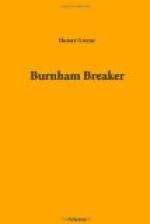“Did Mr. Sharpman know that you were in his office when this conversation took place?”
“No, sir; I guess not.”
“Did Rhyming Joe know you were there?”
“No, sir; I don’t believe he did.”
“From the conversation overheard by you, have you reason to believe that Rhyming Joe is acquainted with the facts relating to your parentage?”
“Yes, sir; he must know.”
“And, from hearing that conversation, did you become convinced that you are Simon Craft’s grandson and not Robert Burnham’s son?”
“Yes, sir, I did. Rhymin’ Joe said so, an’ he knows.”
“Did you see Rhyming Joe last night?”
“No, sir. Only as he passed by me in the dark.”
“Have you seen him to-day?”
“No, sir; he promised to go away this mornin’.”
“To whom did he make that promise?”
Sharpman was on his feet in an instant, calling on Ralph to stop, and appealing to the court to have the counsel and witness restricted to a line of evidence that was legal and proper. He saw open before him the pit of bribery, and this fearless boy was pushing him dangerously close to the brink of it.
The judge admonished the defendant’s attorney to hold the witness within proper bounds and to proceed with the examination.
In the meantime, Goodlaw had been thinking. He felt that it was of the highest importance that this occurrence in Sharpman’s office should be made known to the court and the jury, and that without delay. There was but one theory, however, on which he could hope to introduce evidence of all that had taken place there, and he feared that that was not a sound one. But he determined to put on a bold face and make the effort.
“Ralph,” he said, calmly, “you may go on now and give the entire conversation as you heard it last night between Mr. Sharpman and Rhyming Joe.”
The very boldness of the question brought a smile to Sharpman’s face as he arose and objected to the legality of the evidence asked for.
“We contend,” said Goodlaw, in support of his offer, “that neither the trustee-plaintiff nor his attorney are persons whom the law recognizes as having any vital interest in this suit. The witness on the stand is the real plaintiff here, his are the interests that are at stake, and if he chooses to give evidence adverse to those interests, evidence relevant to the matter at issue, although it may be hearsay evidence, he has a perfect right to do so. His privilege as a witness is as high as that of any other plaintiff.”
But Sharpman was on the alert. He arose to reply.
“Counsel forgets,” he said, “or else is ignorant of the fact, that the very object of the appointment of a guardian is because the law considers that a minor is incapable of acting for himself. He has no discretionary power in connection with his estate. He has no more right to go on the witness-stand and give voluntary hearsay evidence which shall be adverse to his own interests than he has to give away any part of his estate which may be under the control of his trustee. A guardian who will allow him to do either of these things without objection will be liable for damages at the hands of his ward when that ward shall have reached his majority. We insist on the rejection of the offer.”




